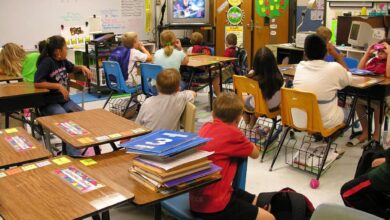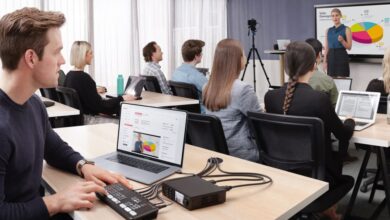What Does a Special Education Coordinator Really Do? Everything You Should Know

If there ever was a behind-the-scene miracle worker keeping special education programs running smoothly, then the special education coordinator is it—the unsung hero amid all the other actors in inclusive learning environments. These coordinators are much more than paper-pushers; they are advocates and strategists that bridge between the special-needs students, their families, and the education system.
For the reader contemplating a career choice or for the general interest of how the special education programs work, this guide outlines everything anyone would need to know about this career-from job duties to stylistic tidbits on how to really grasp the depth and breadth of this enormously important profession.
Table of contents
- What Is a Special Education Coordinator?
- Skills That Every Special Education Coordinator Should Have
- Step by Step Instruction: Becoming a Special Education Coordinator
- The Real Impact Why This Role Matters
- Challenges Faced by Special Education Coordinators
- Tools & Resources for Special Education Coordinators
- How Special Education Coordinators Cooperate with Other Roles
- Pro Tips for Aspiring Coordinators
- Conclusion
- FAQs
What Is a Special Education Coordinator?
A special education coordinator is charged with the overall operation and implementation of programs for the education of students with disabilities. At the district or school level, they ensure compliance with laws such as the Individuals with Disabilities Education Act and provide various resources and supports to those involved in special education-teachers, paraprofessionals, and students.
Key Duties
- Program Oversight: Individual Education Programs (IEPs) are administered by them, with the special education goals and objectives being aligned to the students’ needs.
- Staff Support: Providing training and support to special education teachers and other members of the educational team.
- Compliance Monitoring: Monitoring that these are in line with the state and federal regulations.
- Resource Allocation: Coordination of the services provided within the district, such as speech therapy, counseling, and provision of assistive technology.
- Parent Liaison: Communicating with families regarding the services provided, student progress, and any changes to those services.
- Data Management: Analyzing student performance data for decision-making purposes.
“Coordinators often shape school identity, which is why the Mindguard Education Logo matters more than many realize.”
Skills That Every Special Education Coordinator Should Have
Being able to perform well in this job requires intermixed skills such as interpersonal, analytical, and leadership, beyond that of knowledge in policies pertaining to education.
Skills Needed
- Emotional Intelligence: Considering both students and staff and quickly identifying the emotions at play, will help navigate the inevitable challenges.
- Organizational Skills: Keeping on top of deadlines related to IEPs, assessments, and compliance reports.
- Communication: Acting as a bridge among educators, families, and external service providers.
- Problem-Solving: Quickly spotting and resolving dilemmas or logistical snares.
- Interpersonal Skills: Motivating teams and advocating for required resources and changes.
Step by Step Instruction: Becoming a Special Education Coordinator
Having or not having an education background aside, this is a step-by-step way to reach the role of coordinator:
1. Earn a Bachelor’s Degree
An education or special education degree is necessary.
2. Acquire Teaching Experience
Historically, many coordinators begin as special education teachers to build experience at the ground level.
3. Pursue a Master’s in Special Education or Educational Leadership
Many of the listed positions include requirements for an advanced degree that focuses on either leadership, policy, or administration.
4. Obtain Necessary Certifications
While requirements vary from state to state, special education certification commonly combineswith educational administration certification.
5. Develop Real-World Experience
This education needs to be paired with real-world experience in areas such as IEP development, compliance tracking, and staff training.
6. Apply for District or School-Level Positions
These positions are available in coordinator positions at the district level, charters, or state agency.
The Real Impact Why This Role Matters
Case Study: IEP Compliance Improvements in California
In San Diego Unified School District, a district-wide initiative led by coordinators with improved compliance of IEPs by 34% in one school year. The keys to successful completion? Targeted professional development and centralized tracking tools-all coordinated by the special education leadership team.
Challenges Faced by Special Education Coordinators
No job comes without its obstacles; here are some you will have to encounter:
- Burnout: It is emotionally taxing to deal with a lot of potential sources of bureaucratic challenges.
- Funding: Sometimes there will be a lack of funding, so you have to fight for services.
- Changing Law: There are too many laws taking effect.
Solutions to Tackle These Challenges
- Build Cooperative Teams: Learning to delegate, and trust in your staff goes a long way.
- Keep on Learning: Keep specific knowledge updated through courses, webinars, and conferences.
- Technology-Friendly: Programs like Frontline or PowerSchool are very useful in keeping compliance and data collation.
Tools & Resources for Special Education Coordinators
Top Technology Tools
- Frontline Special Ed & Interventions
- SEIS (Special Education Information System)
- EasyIEP
- Google Workspace for documentation and collaboration
Further Development
- Council for Exceptional Children (CEC)
- IRIS Center by Vanderbilt University
- Online licensing programs and webinars specific to your state
How Special Education Coordinators Cooperate with Other Roles
An effective coordinator never works in a vacuum. Here is how they are collaborating:
| Role | Type of Collaboration |
|---|---|
| Special Education Teachers | Training, IEP support |
| General Education Staff | Inclusion planning |
| Parents | Updates, advocacy |
| Administrators | Budget, policy alignment |
| Therapists | Service coordination |
Pro Tips for Aspiring Coordinators
Build Relationships Early – Networking with administrators and mentors is key.
Document Everything – Paper trails are your insurance policy in legal or compliance issues.
Use Data to Advocate – Use the numbers to justify for requested services or funding.
Lead With Empathy – Compassion is your most potent tool for leadership.
Conclusion
Special education coordinators are the glue holding inclusive education systems together. They’re policy experts, compassionate communicators, and proactive problem-solvers who ensure every student gets the support they deserve.
If you’re looking to step into a role whereby you can make a systemic impact while advocating for some of the most vulnerable learners, then a special education coordinator role could be your calling.
“For more on classroom leadership and school branding, visit the BusinessVantify.”
FAQs
1. What is the role of a special education coordinator?
A special education coordinator takes care of programs and services designed for disabled students that are followed up by legal requirements and developmental teams working with teachers.
2. Is certification mandatory for special education coordinators?
A valid teaching license is a requirement, mostly in many states with advisory support special education and administration.
3. In which organization does a special education coordinator works
They are mostly in a school district, public or private school, and sometimes even at the state’s education level.
4. Does a special education coordinator suffer a lot of stress?
Yes, there is a high responsibility and legal accountability, but those who are passionate about inclusive education would find it rewarding.





